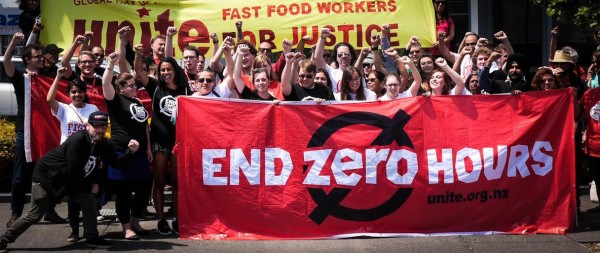
As I am writing (Thursday, March 10), the New Zealand parliament has unanimously passed a law that will eliminate zero hour contracts for New Zealand workers.
Nearly every party represented in parliament is claiming victory. National claimed they are the ones to have introduced this law. Labour says it is their amendments that make it a reality. The Maori Party and United Future say that their withdrawal of support for the National draft forced this change. All of that is true.
But the true authors of this law are the thousands of members of Unite Union in the fast food industry who have been fighting insecure hours for a decade and who named and shamed fast food employers as users of zero-hour contracts.
In fact, Unite Union introduced the term “zero-hour contracts” into the public discourse in this country.
We had been trying to get what we called “secure hours” in the fast food industry since we launched the “SupersizeMyPay.Com” campaign in 2003 and secured the first collective agreements in the industry in decades over the next few years. We had three demands: A substantial lift in the minimum wage; an end to youth rates and secure hours.
We were successful on the first two counts but every attempt to get secure hours was thwarted by the companies. We got promises to offer hours to existing staff before new staff were hired written into our agreements but they were virtually unenforceable in such high turnover industries.
At the end of the collective agreement negotiation round in 2013, we told all the employers that we would come back in 2015 determined to achieve guaranteed hours for all staff. We kept reminding them at each meeting until negotiations started early in 2015.
We also prepared to launch a public campaign to support our demands. We knew we lacked strong economic power. It is a challenge to shut the stores for very long when we take industrial action. In most companies we remain a minority union. Members have to be very brave to take action when they know that companies can simply retaliate by cutting their hours.
But we do have a strong moral advantage over these companies that can be turned into a political strength if we can attack their brands as cheats and exploiters of often young and vulnerable workers. Because people instinctively know we are actually telling the truth, their brand power can be turned into a weakness.
The issue of “zero-hour contracts” had become an issue for public debate in the United Kingdom over the last few years and we thought that was a term that accurately portrayed the reality of work for our members.
We decided to adopt the slogan “End Zero Hour Contracts”. We printed banners, placards, badges, stickers in preparation. We made the campaign the theme of our December 1, 2014 national conference. We organised a national fast food delegates conference to discuss and plan the campaign in February 2015. Negotiations with all the fast food companies began that same month.
A very fine series of reports by Radio New Zealand’s Economics Correspondence Patrick Omeara kicked off the public discussion. He took the time to look at the contracts, talk to the companies and most importantly talk to the workers who actually struggle under these contracts.
This was followed up by the story becoming almost the swan song of the Campbell Live show with a multi-part series that investigated the issue in depth and followed our negotiations with blow by blow accounts over several months. In one fun show, John Campbell even interviewed McDonald’s customers.
By that stage, even right-wing journalists were claiming opposition to zero-hours.
The impact of a public campaign led by workers, combined with the strong media and public interest and support, eventually forced the companies to capitulate one-by-one. On the eve of May Day, the final hold-out – McDonald’s of course – signalled their surrender.
(For a more detailed account see “How Unite took on fast food companies over zero hour contracts.”)
Today, even the very pro-big business New Zealand Herald editorialised celebrating the end of zero hour contracts as a “victory for all.”.
At first, the government made a commitment to get rid of “the worst aspects of zero-hour contracts” rather than banning them.
The first draft of the law actually made zero-hour contracts lawful with some indeterminate compensation. But the government had been trapped by its promises to do something. When the support parties for the National Government in parliament withdraw their support for the draft law they had no choice but to seek a compromise with the opposition parties. Labour and the Greens appear to have used that opportunity effectively in the changes they insisted on for their support. The end result being a law that will end zero hour contracts in my view.
In essence under the new law:
1) Employment agreements need have some agreed and guaranteed hours stipulated.
2) Unless there is an “availability provision” in the agreement any additional hours can be refused and an employee may not be treated adversely for doing so.
3) The hours of work that have been stipulated in the employment agreement needs to be recorded and to reference the days of work and the start and finish times.
4) employment agreement can stipulate an availability clause for other hours to be available for work but this needs to be for good reasons and “reasonable” compensation paid for having such a clause.
5) A shift cancellation clause needs to be part of the agreement. If it is not in an agreement then full compensation must be paid for a cancelled shift. If it is included it must have: “reasonable” notice and “reasonable” compensation.
This struggle was an example of how politics often actually works. Change comes from struggle in the streets. It is there that the fight for the hearts and minds of the people takes place. Politicians and parties usually arrive later. Unite Union was part of the massive campaign to end youth rates and lift the minimum wage in real terms. Parliament followed.
Unite also took the lead to end zero hour contracts. Without our campaign nothing would have changed. The success has been enormous. We know we could not have succeeded without the support and sympathy of other unionists, sympathetic journalists, and friendly political parties.
We are also aware that in the end we need political parties represented in parliament to change laws and we are thankful to those parties who helped make that happen. But let no one claim this victory as exclusively theirs.






This is a hollow victory and a major step backwards. Unions still have not learnt from past mistakes. Over thirty years ago when the Neo-liberals came into power they offered the once powerful unions a choice of casual/zero hour contracts. The Unions turned it down. What they should have done is accepted it and demanded a series of benefits, not just for workers but for everyone in society.
Unions, with their political influence and numbers, should have pushed for a basic income. I’m not surprised Unions in this country have stayed silent on the issue of a basic income. They’re afraid membership will decline if individuals received a basic income.
The nature of work is changing. The traditional 40 hour working working is a relic of the mid 20th century, or what is nostalgically referred to as the golden age of capitalism. Unions, Labour, National, Neo-liberals believe that everyone should earn a living. The only practical way for everyone to earn a living is to give everyone a job. Such an idea shows a lack of understanding of the basics of economics. In fact, there has only been two regimes on this planet where everyone was made to earn a living, the USSR and Nazi Germany. Both nations ended up in ruins.
By removing zero-hour contracts, Unions, Labour and the National party have doomed everyone in this country to a life of subordinated labour. I repeat: No one should be forced to earn a living. Everyone should be provided with an adequate sum to cover their accommodation and food arrangements.
People today don’t want to be spending 40 hours a week in the office, the factory or in the mine. They want to be engaged in the productive work within the family home. Looking after children, cooking, cleaning, taking out the trash, cleaning out the gutter. The type of working unions and politicians have ignored as productive labour.
Coupled with decline of the social security system, everyone will be forced to compete to earn a living and there aren’t enough ‘jobs’ to go around for a nation of 4.5 million. Ironically, the end result will be lower wages, dwindling enterprise benefits,
Dude it was a life of subordinated labour for many while zero hours were in force. Don’t have the time to go through the number of points that I think are wrong, suffice to say, I did wonder what planet you live on, and contrary to your beliefs, relegating exploitative and abusive zero hours to the rubbish bin is a major step forward, and is a massive victory, and it’s one that can be built on.
You claim that you don’t have the time to go through that points that I made, which you think are wrong.
What you’re really saying is that you don’t have a genuine rebuttal and resorted to implicit ad hominem attacks.
Are you really going to argue against the idea that work done within homes is not worthy of financial compensation? Is it because the type of work done has historically been performed by women? That would be sexist.
Are you going to tell people that are homeless they need to find a job and work harder? Not much choice in that. Although that reasoning has been the hallmark of neo-liberalism.
Nonetheless, how is relegating zero-hour contracts a major step forward? All it has done is further entrench the idea that everyone should earn a living. If you want to eat then you need to get a job. Vladimir Lenin once said that “he who does not work, shall neither eat”. Neo-Liberals like the prime minister are saying the same thing today. “Take responsibility, worker harder, society doesn’t owe you anything”
The fact is this. A basic income does more for individuals and society. It liberates individuals and gives them the freedom of choice. If workers on zero hour contracts had a basic income then we wouldn’t have the exploitation that is rampant in the labour market. Individuals who participate in the labour market will always been in a stronger bargaining position against their boss when they have financial security.
I would just like to make a correction
I said: “Are you really going to argue against the idea that work done within homes is not worthy of financial compensation?”
It should have been ” Are you going to argue against the idea that work done within homes is worthy of financial compensation
Have you herd of the second best? Link: https://en.wikipedia.org/wiki/Theory_of_the_second_best
Basically the theory is based on the perfect Neo classical economic model (which neoliberalism is derived from) and says that you should remove both monopolies and union. But if you remove just one, either unions or monopolies, then the Neo classical/ Neo liberal model you speak of becomes useless. Because you have a situation where one becomes more dominant and sucks the life out of the economy.
Enjoy your light reading. If you have any question meet back here after you have read the theories properly then I will be all to happy to help.
i agree that everyone had a part to play..unite..(some) media..etc..and kudos to them all..
..but the basic political-fact no matter how you choose to slice and dice it is that had dunne and the maori party gone along with the govt..
..we would still have zero hours..end of story..
..we don’t have zero hours because the tories couldn’t get the numbers..
..(just as harawiras’ opposition to repealing pot laws/blocking that ad-campaign is the fulcrum upon which swings his/manas’ defeat..as in had he not done that he would now be in parliament..
..so that tory sucker-fish rebellion is the fulcrum in this one..had dung and maori party not opposed..there would be no ‘victory’ to celebrate..
..how could that be any clearer..?..and any more irony-overdose inducing.)
..and yes it is a victory..but the union movement still has a very long way to go to make up for their craven obeisances in the face of rogernomics etc..
..to see how another union movement reacted to those same forces at that same time..look to australia…
..there..the unions said ‘no..yer fucken not!’..and stood up and fought for workers’ rights….
..whereas here..?..yeah..nah..eh..?
..they folded like a soggy bus-ticket..
Any bounce in the recovery of the economy is the result of artificial money creation. We are not experiencing growth.
These artificial constructs are hedge funds trading around stimulus packages. With catchy names such as public private partnership in things like the Auckland rail link and state housing sell offs.
So there is no underlying economic growth because unemployment is still rising. The way they massage the numbers in NZ (even across the world unemployment is a plague everywhere) is they’ll say the rate of job loss is not as great as it has been, because, every one can get part time or temper or work low wage work, or that wages themselves are deteriorating the amount of money going into people’s pockets, AND:
-With out money going into people’s pockets there is no savings
-With out savings there is no capital
-and with out capital there is no capitalism
-With out free market capitalism there is no modern notion of democracy
There are two distinct tribes I encourage all New Zealanders to categorise themselves under, speculators and savers.
If you are a speculator your interests are cheap money because you are trying to borrow as much money as possible, and to use that purchasing power to coerce the political system to bail you out each time you make a mistake.
Now if you are a saver you want interest rates higher (above 4.9%) you want wage growth as a result of higher interest rates. Savers want the political class to demand from the banking class higher rates of reserve requirements. Savers also want the NZ dollar to be backed by some gold.
Borrowers and speculators are the enemy of social cohesion and the enemy of a desire to have productive meaningful lives.
Savers need to be allowed for there wages to rise, not as fast as inflation as some suggest. Savers wages should rise as fast as the money supply growth, and should be the target. If money supply growth rises year on year 15%, the workers at AFCO should be arguing there wages should grow 15% year on year, to maintain savers purchasing power.
The leadership in the unions I believe is sincere. But I believe there way of thinking needs a little bit more developing because it’s not taking on the full economic picture.
I think we should take a more structural approach to the living wage concept by creating a fourth economic leaver that pira passu’s money supply growth with the minimum wage.
Comments are closed.